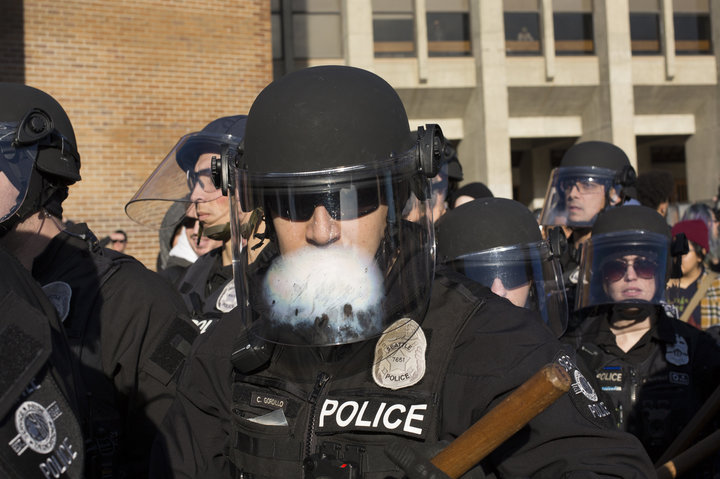VIDEO: Remember the slimeball professor who assaulted a Trump supporter with a bike lock? Charged with 4 felonies, probable jail time

Justice awaits the attacker who assaulted a Trump supporter at Berkely last month. Eric Clanton has been charged with four felonies, which should most certainly warrant some time behind bars.
According to Berkeleyside, Clanton, a former East Bay community college philosophy professor linked online to violent assaults with a metal bike lock during a “free speech” rally in Berkeley on April 15, was charged Friday afternoon with four counts of assault with a deadly weapon, a felony, with the special allegation of causing great bodily injury to Sean Stiles. Additionally, the charges include the misdemeanor offense of wearing a mask to evade identification. If convicted, Clanton could be sent to prison.
Clanton, 28, of Oakland appeared alongside his attorney, Dan Siegel, in Alameda County Superior Court before Judge Thomas Nixon in Department 112. Siegel, who has been active for decades in East Bay social justice circles, rose to fame in the 1960s as a student activist at UC Berkeley during clashes with authorities.
Clanton pleaded not guilty to all charges and Judge Nixon set bail at $100,000. The routine hearing lasted only 15 minutes.
“I imagine we’ll get him out this weekend, maybe tonight,” Siegel said.
Clanton will next appear in court on June 14 to set dates for the preliminary hearing.
Outside the courtroom before the arraignment, Siegel became involved in a heated back-and-forth argument about free speech and the alleged violence from Clanton with about 10 right wingers. One had a Make America Great hat on, another carried the so-called Kekistan flag. A few of the protesters started a chant of “lock him up, lock him up.”
In the courtroom, one of the right wing protesters was escorted out because he was livestreaming the proceedings and was told repeatedly by the judge to stop. Otherwise, there was no disturbance in the courtroom.
“This case arises in the context of a demonstration by a group of loosely described out-of-town, right wingers… who uttered racist and homophobic comments and engaged in pushing and shoving” with counter-demonstrators, Siegel said in a statement to the judge.
Siegel told the judge that both he and Clanton had received various threats both online and personally.
“This is a political attack on an individual who has a clean record in this community,” Siegel said.
Soon after April 15, Clanton was “outed” online, on the website 4chan, as someone who used a bike lock to strike a man in the head. The assault was captured in a video clip (below) that drew widespread attention and anger after it was posted on YouTube. Berkeley police had been widely criticized in far right social media posts for not arresting Clanton until Wednesday.
Just as the demonstrations in April brought two rival camps into conflict, reaction to Clanton’s alleged actions has also split. Some so-called antifa activists have called Clanton a hero for taking the fight against “fascism” and hate speech to the streets. Right-wing, pro-Trump activists have called him a “thug,” using unjustifiable tactics against people who simply want to express their views. Still others have said Clanton gives leftists a bad name and that violence is never the answer.
Berkeley became a focus for action by both far right and far left activists following the violent protests on Feb. 1 that led to UC Berkeley canceling a planned appearance by right-wing provocateur Milo Yiannopoulos. Large protests occurred in downtown Berkeley on March 4 and April 15.
Unlike earlier arrests reported during and after Berkeley protests this year — which have resulted in no criminal charges thus far — the BPD homicide team handled the Clanton investigation because of “the severity of these felonious assaults.” BPD described the assaults as “violent” and said Clanton was shown on video “striking people in the head with a U-shaped bicycle lock causing significant injuries to the victims.”





